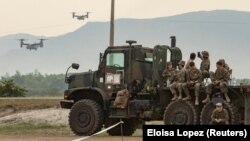For more than seven decades, the U.S. and Philippine forces have trained and fought alongside each other. “Today,” said Secretary of Defense Lloyd Austin, “we’re building on those bonds to bring greater security, stability, and prosperity to the Indo-Pacific for the next 70 years and beyond.
The United States and the Philippines reaffirmed that their Mutual Defense Treaty remains the bedrock of their cooperation. This treaty, explained Secretary Austin, “applies to armed attacks on either of our armed forces, our aircraft, or public vessels – including our Coast Guard – anywhere in the South China Sea.”
Both nations discussed plans to open four new Enhanced Defense Cooperation Agreement locations in Palawan and northern Luzon, said Secretary Austin:
“These sites will support combined training exercises and interoperability between our forces to ensure that we’re even better prepared for future crises.”
By the end of fiscal year 2023 the United States expects to have allocated more than $100 million in infrastructure investments at the new and existing Enhanced Defense Cooperation Agreement sites. Those investments will spur job creation and economic growth in local Philippine communities, said Secretary Austin. “We’ve also committed to swiftly finalizing the U.S.– Philippines bilateral defense guidelines, which charts our vision for alliance cooperation across all operational domains, including space and cyberspace.”
Secretary Austin and his Philippine counterpart Secretary Galvez agreed to redouble their efforts to strengthen the U.S.-Philippine ability to resist armed attack by modernizing U.S. and Philippine armed forces. Both leaders also discussed plans to deliver over the next five to ten years radars, unmanned aerial systems, military transport aircraft, and coastal and air defense systems.
These new defense commitments will “further integrate our strong bilateral ties into multilateral networks, including with Japan and Australia, and we discussed plans to conduct combined maritime activities with likeminded partners in the South China Sea later this year as we work to enhance our collective deterrence,” said Secretary Austin.
“Our alliance is ultimately guided by our deep and enduring commitment to freedom. So, we’re not just allies, we’re democratic allies,” said Secretary Austin, “and the United States and the Philippines are bound by a common vision for the future – a vision that’s anchored in the rule of law and freedom of the seas and respect for the territorial integrity of sovereign states.”






